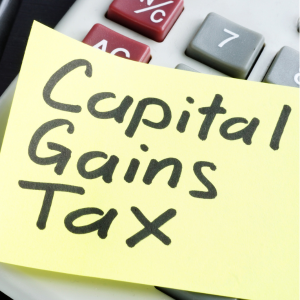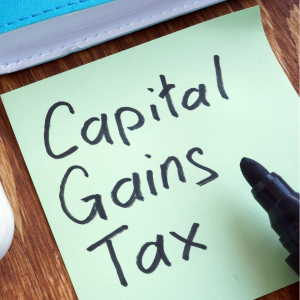
Get expert guidance with Sell With Isaac Vancouver, WA, capital gains tax calculator. Quickly estimate your taxes and make confident financial decisions.
Understanding Capital Gains in Vancouver, WA
Capital gains represent an essential financial principle, particularly in areas such as Vancouver, WA, where real estate and investment activities are significant. With increasing property values, grasping the effects of capital gains on your taxes is essential for effective financial planning. In Vancouver, understanding the definition of capital gains and the various types that exist is essential for minimizing unnecessary tax liabilities. Delving into these elements, including their importance and differences, can empower investors and homeowners to make well-informed choices regarding their properties. Grasping these subtleties is crucial for successfully maneuvering through the capital gains environment in Washington.
Definition and Importance of Capital Gains
Gains acquired from selling a capital asset for a higher price than its initial cost are termed capital gains. Gaining profits through appreciated assets is a primary consideration for personal financial investment within a growing market such as the Vancouver, WA, region. Unlike salaries, capital assets such as real estate and stocks generate profits through transactions, which makes capital gains an important focus for potential investors.
Vancouver residents must also understand the significance of capital gains as it pertains to personal tax and financial strategy. Well-timed asset sales to utilize losses against profits can significantly lower taxable gains. Capital gains must be a focus of personal investment strategy since Washington has no income tax, which, in turn, emphasizes capital gains. This directly affects the type of investments residents of Washington decide to pursue.
Capital gains are an important measure of the health of the market overall. The frequent changes in capital gains provide signs as to the changes in value of an asset and the need for investors to rethink their investing strategies. For long-term estate value and for those trading assets for short periods of time, understanding the gains is very important due to the volatility of the market. The appreciation and depreciation of the gains help Vancouver residents to coordinate their goals in the most financially successful manner. That financially successful manner would provide the strongest possible returns and the least tax liability.
Types of Capital Gains in Vancouver, WA
There are two main types of capital gains: short-term and long-term. This is based on the amount of time an asset is held. In the case of short-term capital gains, the profit from the sale of an asset is counted as gain if the asset is sold within a year of being bought, and the tax imposed on it is at the higher ordinary tax rates. This type of classification is primarily the reason why people do not prefer rapid transactions for highly priced assets within high-demand zones, like Vancouver, WA, where subtleties within the market affect the timing of the sale greatly.
Long-term capital gains, as the name suggests, are gains from the sale of assets that are held for more than a year. The reason for this being advantageous is the tax rates. This is especially the case in real estate markets when values increase quickly over time. In Washington, the use of long-term capital gains is highly appreciated for the tax savings attributed to the hold time for an asset. This is especially true for long-term investments in real estate within Vancouver.
Differentiate well among the types. Besides taxation, the purpose of the investment, the individual’s financial situation, and other factors will help decide whether to pursue the short-term or the long-term. While short-term returns seem attractive, long-term sustained growth usually comes with lower tax implications and the potential for greater ultimate returns. Effective management of assets in Vancouver often entails the integration of the different types of gains to optimize returns while minimizing tax liability. Understanding the different types allows investors to tailor their approach based on the Washington tax brackets for strategic decision-making to enhance outcomes financially.
Want to sell your home for cash in Vancouver and nearby cities? Sell With Isaac offers a fast and fair offer, letting you close on your schedule in a simple, stress-free way to sell your property quickly.
Exploring the Capital Gains Tax in Washington

The capital gains tax situation in Washington is very different from that in many other states. This is mostly because there is no state income tax, which changes how capital gains are calculated. For investors and homeowners in Vancouver, WA, it is very important to know how the capital gains tax works and how much it costs. Also, looking at Washington’s capital gains tax in comparison to that of other states shows differences that can affect how people invest. These tips give you a better understanding of how to deal with capital gains tax in the Evergreen State.
Applicability and Rates of Capital Gains Tax
Washington’s capital gains tax is different from those in other states since Washington doesn’t have an income tax. Because of this, the state focuses on capital gains to make money from investments. This tax is on the money you make from selling capital assets, which are things like stocks, bonds, and real estate. People who live there and people who invest need to be very careful about how these taxes affect their decisions about whether to sell assets and when to invest.
Washington has a special manner of setting rates. It is more concerned with the rules for capital gains than with the different levels that are customary in other places. The rate is a flat tax, which makes it easier to figure out, but you have to plan ahead to get the most out of it. The federal capital gains tax rates are different from this flat tax since they vary based on how much taxable income you have. This underscores how vital it is to know both state and federal tax rules well to prevent getting surprise tax bills.
Washington’s capital gains tax only applies if the gains are above a certain amount. This is a smart way to shield smaller investors from having to pay it, and it accords with the state’s purpose of going after big wealth accumulations. This strategic threshold consideration ensures that the most common transactions, like selling a big house, won’t be affected. This is good for the normal person who doesn’t sell things very often or for very much money.
People who live in or invest in Vancouver, WA, need to know some essential facts regarding the application and rates. People in Washington state should be mindful of how capital gains tax can affect their whole financial status because there is no state income tax to protect transactions. Because of this focus, it’s crucial to plan carefully and time asset transactions to pay less in taxes and get the most out of investments. By thoroughly comprehending Washington’s capital gains tax system, people can safeguard their financial interests and get better at making long-term plans.
Comparing the Gains Tax with Other States
Washington’s capital gains tax policy presents distinct difficulties and opportunities that are markedly different from those in adjacent or even remote jurisdictions. A lot of states have both an income tax and a capital gains tax. This changes the total amount of taxes people have to pay and makes it harder to compare taxes between jurisdictions. When people own assets in more than one state, capital gains generally make up a large part of their overall taxable income. This makes it harder for those people to think about fiscal policy.
Washington is different from other states since it doesn’t have a state income tax. This sets it apart from areas like Oregon and California, where the total tax burden can be very high. People and businesses in these states have to pay both state income taxes and federal capital gains taxes, which means they need to have detailed financial plans to stay in compliance and make the most money.
In Washington, on the other hand, there is no state income tax, which might mean savings. This makes it a good place for people who want to move or invest to find a better tax situation. But looking at state capital gains taxes isn’t just about the rates; it’s also about how each state’s tax policy treats gains. For instance, some states might have deductions or credits that Washington doesn’t have. This would change the effective tax rates and how you should invest your money.
Investors who manage portfolios that cover more than one area need to know about these subtle differences. In addition, the capital gains tax rate can be different in different states depending on the type of asset, how long it has been owned, or the total annual income. When analyzing Washington’s approach, investors need to know these standards so they can make the most of every opportunity.
The flat tax model used in Washington makes this procedure easier, but it can be hard if the assumptions about earnings and losses are wrong. This is especially essential for people in Vancouver, WA, because the local economy depends on changing real estate and investment opportunities. People can make choices that maximize their economic benefits while still following tax regulations if they strategically manage these assets and are aware of how taxes differ between states. This knowledge shows how important it is to have an informed approach to tax planning when looking at the economies of both the state and the country.
At Sell With Isaac, we buy houses in Longview and the surrounding areas. Sell as-is, skip fees, and close fast for a simple, stress-free home sale.
Using a Capital Gains Tax Calculator for Accuracy in Vancouver, WA

Accurate calculation of capital gains is essential for sound financial planning, particularly in areas such as Vancouver, WA, where property and investments flourish. A capital gains calculator serves as an essential resource, providing accuracy that aids in adhering to Washington tax laws and enhancing your financial planning. This tool enables users to calculate potential tax liabilities by considering asset values, transaction dates, and local tax thresholds. Grasping how to utilize its advantages can significantly improve your capacity to file taxes effectively and strategize future investments. Discover the benefits and understand how to utilize this tool for smooth financial management.
Benefits of a Capital Gains Calculator in Vancouver, WA
Employing a capital gains calculator offers a variety of benefits for investors and homeowners, particularly for those exploring the financial environment of Vancouver, WA. This effective tool streamlines the intricate process of determining potential tax obligations on gains from asset sales, including real estate or securities. By precisely calculating these liabilities, the tool allows users to plan ahead before submitting their returns, ensuring compliance with the Washington capital gains tax laws.
A key advantage of using a gains calculator is its capability to forecast future tax obligations, enabling investors to tailor their selling strategies for the best tax results. By exploring different scenarios, users can understand how varying sale dates or asset values could influence their tax responsibilities, enabling them to make well-informed choices about their investments. Additionally, the gains calculator helps in identifying how particular tax strategies can be utilized to reduce tax liabilities.
For instance, grasping the effects of retaining an asset for over a year might uncover significant savings thanks to the reduced tax rates associated with long-term capital gains. This tool also assists in pinpointing possible deductions or offsets, like leveraging investment losses to balance out gains, which can lead to a decrease in taxable income.
For individuals overseeing a varied portfolio of assets, including real estate, stocks, or other investments, the calculator acts as a crucial element in effective financial planning. It helps pinpoint the optimal moments for making sales while also taking into account all possible financial consequences. By taking a proactive approach to planning asset sales and comprehending how each decision fits into their overall financial strategy, individuals can steer clear of unforeseen tax surprises and enhance their returns.
In the end, the capital gains calculator serves as a vital tool for individuals aiming to enhance their financial precision and efficiency within Washington’s distinct tax environment.
How to Use the Calculator Effectively in Vancouver, WA
When utilizing a capital gains calculator, a methodical approach ensures that decisions remain accurate and aligned with the particulars of Washington’s tax policies. Initially, gathering all asset-related information is important. This includes the purchase and sale prices, dates of acquisition and sale, and other relevant costs. Determining the capital gains tax liability hinges on accurate and complete information; thus, having this information is necessary to attain accurate results.
Inputting the information on the calculator requires focus and precision. It is important to assess whether it is a short-term or long-term capital gain since this determines which tax brackets apply in Washington. Accurate asset classification is critical in estimating potential tax savings since long-term gains have more tax-saving potential. Revising different scenarios helps in identifying tax-planning opportunities.
Updating and reassessing asset positions are critical for understanding and leveraging the gains calculator optimally. Changes in the financial markets and in the individual assets that comprise a portfolio may alter expected taxable gains. The risks associated with asset classes may also have a statistical impact. Regular updates to the calculator are necessary to ensure that strategic asset divestments and reinvestments are based on current market data. It can greatly enhance financial and tax outcomes.
Integrating the calculator outcomes with other financial planning tools and techniques increases effectiveness. Analyzing outcomes with other financial parameters, like income projections and expected return on investments, helps in the formulation of more effective strategies that will help in the attainment of the set financial objectives. Financial planners with expertise in Washington state capital gains tax will enhance the value of the calculator outcomes in the decision-making process and provide a more systematic and strategic approach to the overall financial planning process.
With these actions, the gains calculator becomes an integral part of strategic financial planning and not just a basic tax estimation tool. The actions recommended ensure that the objectives and outcomes of the financial plan are maximized while remaining tax compliant.
Use a capital gains tax calculator to estimate taxes and plan smarter sales. For more help, Contact Us at Sell With Isaac.
Filing a Tax Return for Capital Gains in Vancouver, WA

In Vancouver, WA, filing a tax return for capital gains is a complicated procedure with important processes and dates that must be followed to stay in compliance with Washington state laws. Taxpayers may make sure they appropriately report their gains and take full advantage of all the deductions and credits available to them by understanding how to file these kinds of forms. This tutorial will explain the most important parts of filing capital gains taxes quickly and easily. It will also give you important information on the tax situation in Washington and the many processes you need to do to file.
Important Steps and Deadlines in Vancouver, WA
There needs to be a methodical plan for filling out a capital gains tax return so that all the important parts are covered and mistakes are kept to a minimum, with the possibility of fines. Collect all the information you need about the assets you need to list on your tax return. For this, the prices for buying and selling, the times of purchase and sale, and any costs that may be deductible are all included. Correctly collecting information is necessary for the whole filing process, since mistakes can lead to credits or overpayments.
It’s important to make sure that all of your important information is correct before learning about the specific filing dates set by both federal and state laws. Avoid fines and interest on unpaid taxes by sending in your tax return on time. The federal date is usually April 15th. However, it’s important for people to know about any state-specific deadlines that may be different because of changes to the law or special extensions. Making these dates in advance will help you stay prepared and in charge of your money.
Finding qualifying deductions is an important part of filing, along with gathering information and keeping track of dates. There are many things that can lower the general tax burden, such as the costs of fixing up a property, buying an asset, and paying transaction fees during the sale. Individuals can also benefit from different credits based on factors such as their income or the type of purchases they make. If you meet the requirements, these credits can greatly lower your total tax liability.
Good planning skills include knowing about and being able to use available tax credits, which can include changes for making home improvements more energy-efficient or for paying for school costs when they apply. Lastly, it’s important to keep a close eye on any changes to Washington state’s tax rules, since these can have an effect on tax credits, the filing process, and the amounts that need to be paid.
By staying up to date on new information, people can improve how they file their taxes every year and adapt to any changes that might affect their legal responsibilities. Understanding these important steps and deadlines is necessary to get the best tax results and make sure you follow the rules when reporting capital gains.
Need to sell your home? Skip the repairs and sell fast. Sell With Isaac offers fair cash offers and handles everything to ensure a smooth, hassle-free process. Call (360) 207-4133 today for a no-obligation offer and get started!
FAQs:
What Are Capital Gains and How Do They Affect Taxes in Vancouver, WA?
When you sell a capital asset for more than you paid for it, you make a capital gain. If you live in Vancouver, WA, you need to know about capital gains since they affect how much tax you have to pay. There is no state income tax in Washington State, which makes the way capital gains are taxed especially interesting.
What is the Difference Between Short-term and Long-term Capital Gains?
Short-term capital gains are profits from selling assets that have been held for less than a year. These gains are usually taxed at a higher rate, just like regular income. Long-term capital gains are for assets that are held for more than a year. These assets normally have lower tax rates, which encourage people to keep onto their investments for longer.
How Does Washington’s Lack of an Income Tax Affect Capital Gains Tax Calculations?
Because Washington State doesn’t have an income tax, it only taxes capital gains that go over a set amount at a flat rate. This method makes calculations easier, but it needs careful preparation to handle tax obligations well.
What is a Capital Gains Calculator and How Can It Assist Investors in Vancouver, WA?
A capital gains calculator can help you figure out how much tax you might owe based on the value of your assets, the date of the transaction, and the local tax limits. In Vancouver, WA, it helps with making accurate financial plans and following Washington’s tax laws, which helps with making plans for selling assets and investing.
What Are the Important Steps for Filing a Capital Gains Tax Return in Washington?
To file a capital gains tax return, you need to get the right information about asset transactions, know when to file, and know what deductions you can use. To get the most out of your tax return and lower your possible liabilities, it’s important to keep up with any changes to Washington’s tax regulations.
Helpful Vancouver Blog Articles
- Sell Your Vancouver, WA Home With Code Violations
- Tenant Damage To Property In Vancouver, WA
- Selling Your House As-Is In Vancouver, WA
- Selling Your Home In Forbearance In Vancouver, WA
- Free Things to Do in Vancouver, WA
- Fun Facts About Vancouver, WA
- Vancouver, WA Closing Costs Calculator
- Vancouver, WA Capital Gains Tax Calculator
- Vancouver, WA Cost of Living
- Best Things to Do in Vancouver, WA With Kids
- Should I Replace My Roof Before I Sell My House in Vancouver, WA?
- Do All Heirs Have to Agree to Sell Property in Vancouver, WA?

